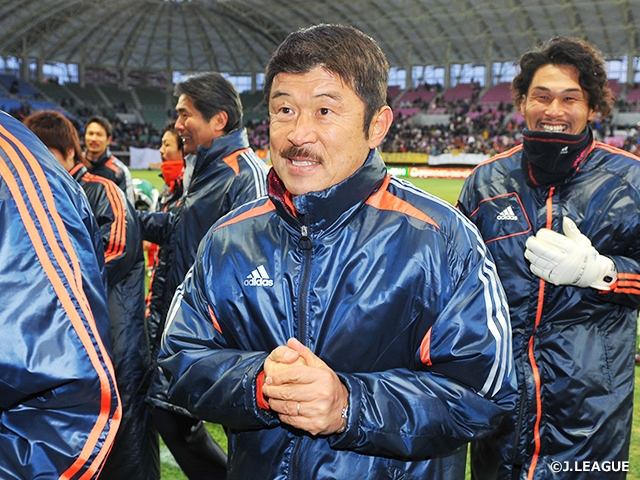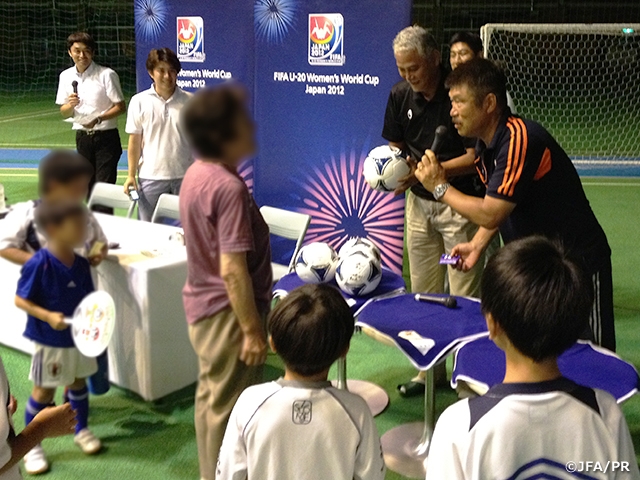NEWS
“The importance to show empathy for the people affected” 10 years since the Great East Japan Earthquake – Relay Column Vol.3
17 March 2021

It has been 10 years since the Great East Japan Earthquake. While the restoration has progressed with a ton of support from home and abroad, there is still a long way to go for a full recovery. Here we will deliver essays and columns of people involved in football, reflecting on their own experience and perspective on the Great East Japan Earthquake.
As our third column, we will share the stories told by Mr. KATO Hisashi, who was named as the JFA Reconstruction Support Coach for a year from October 2011.
There was a reason to carry out personal activities immediately following the earthquake. Kato Hisashi was born in Rifu, Miyagi. Although his parents’ house facing the sea has flooded, the islands of Matsushima Bay weakened the force of the waves to keep the house from getting obliterated. However, the scenery of the neighbourhood, which he had become accustomed to since he was a child, changed completely, and the moment he witnessed it, he lost his words. So it was only natural for him to think that he had to do something for his hometown.
He drove his own car many times from Tokyo to deliver vegetables and other supplies that might be short at the site. He also came across people who still felt the gratitude from the support they received during the Great Hanshin Earthquake. There were also people from the chef’s union who drove all the way from Ako, Hyogo, to prepare soup kitchen for the affected people. The support activities were carried out with all sorts of people.
However, as he conducted support activities over time, he felt the limits of what he could do as an individual. And that was when people within JFA started talking about providing reconstruction support as an organisation. Six months following the natural disaster, in October 2011, Kato took on the task of providing support to the affected area as JFA’s Reconstruction Support Coach.
“The first thing we had to do was to check the damage. Since the area affected by the disaster was widespread, I rented a car and first went south along the coast from Aomori. From there we headed north from Sendai. We even approached areas in Fukushima that were off limits due to the influence of radioactivity.”
A relatively large amount of support was provided in areas with good transportation facing the Sendai Plain. However, the conditions were different in areas such as Minamisanriku, Kesennuma, Rikuzentakata, Ofunato, Otsuchi, and Miyako, which are located north of the coast. It was far from the Tohoku Shinkansen and Tohoku Expressway, which pass through the inland area, and it took nearly two hours from Tono and other towns they used as their base. Unfortunately, the inconvenience of transportation was proportional to the depth of support.
What are the needs on site? The locals know their land best. The contact person was the people from the football associations of each municipality. Many of these people worked for the town’s administration, and they helped create a list of what was needed and what they already had.
In addition, many other sports organisations, makers, and individuals also provided support to the affected areas. However, there were still no places to play football. There were no lightings because all the infrastructures were broken. So the parks couldn’t be used at night. Excluding for some parts of Hokkaido, the coastal area of Tohoku is located in the easternmost part of Japan. That meant that they had the earliest sunset in Japan.
We wanted to provide children a place to play football. It was necessary to prepare lighting equipment that can store electricity and is easy to use. The lighting equipment used by the British Army were selected after comprehensively judging the convenience to carry them around. The lights that illuminate the children's wishes were distributed to each region in conjunction with the J.League.

As the former captain of the Japan National Team, he was a popular figure. But Kato always showed empathy and worked closely with the people.
“Most of the teams’ coaches themselves were affected by the disaster. Those coaches had to take care of the children while also caring about their own lives. Therefore, when we held football classes, we didn't decide the place for our own convenience, but rather held them at their convenience. It really made me realise the importance to work closely with the lives of the people affected by the disaster.”
Before the earthquake, he was used to approaching the kids by asking, “How’s your dad doing?” However, being exposed to many stories of lost lives made him hesitant to ask such question. But as he made countless visits to the sites, kids started to talk about topics that he thought he should not mention. It was a sign that he had gained their trust.
“We often hear the phrase ‘giving courage to the affected area’ but in reality, it was us who were getting encouraged. I sometimes wondered if I was doing the right thing, but the important thing is to be there. That was my main approach.”
He was named as the support coach for a year, and it has been eight years since leaving the position. However, the relationship between Kato and the affected people still remains strong.
Related News
-
2021/03/15
“My mind was occupied with thoughts on how I can help as a Japanese citizen” 10 years since the Great East Japan Earthquake – Relay Column Vol.2

-
2021/03/12
“Japan’s ability to reconstruct is the best in the world. Let’s bounce back from this adversity” 10 years since the Great East Japan Earthquake – Relay Column Vol.1

Latest News
-
National Teams
2025/07/10
【Match Report】Yakata and Takikawa Score Debut Goals in Nadeshiko Japan’s 4-0 Victory Over Chinese Taipei

-
National Teams
2025/07/09
【Match Report】SAMURAI BLUE Thrash Hong Kong, China 6-1 with Germain Scoring Four Goals on His Debut

-
National Teams
2025/07/03
SAMURAI BLUE (Japan National Team) squad & schedule - EAFF E-1 Football Championship 2025 Final Korea Republic

-
National Teams
2025/06/28
【Match Report】Nadeshiko Japan Fall 1–3 to Spain

-
National Teams
2025/06/24
U-16 Japan National Team squad & schedule - China PR Tour: CFA PEACE CUP (7/1-9@Shenyang, China PR)



